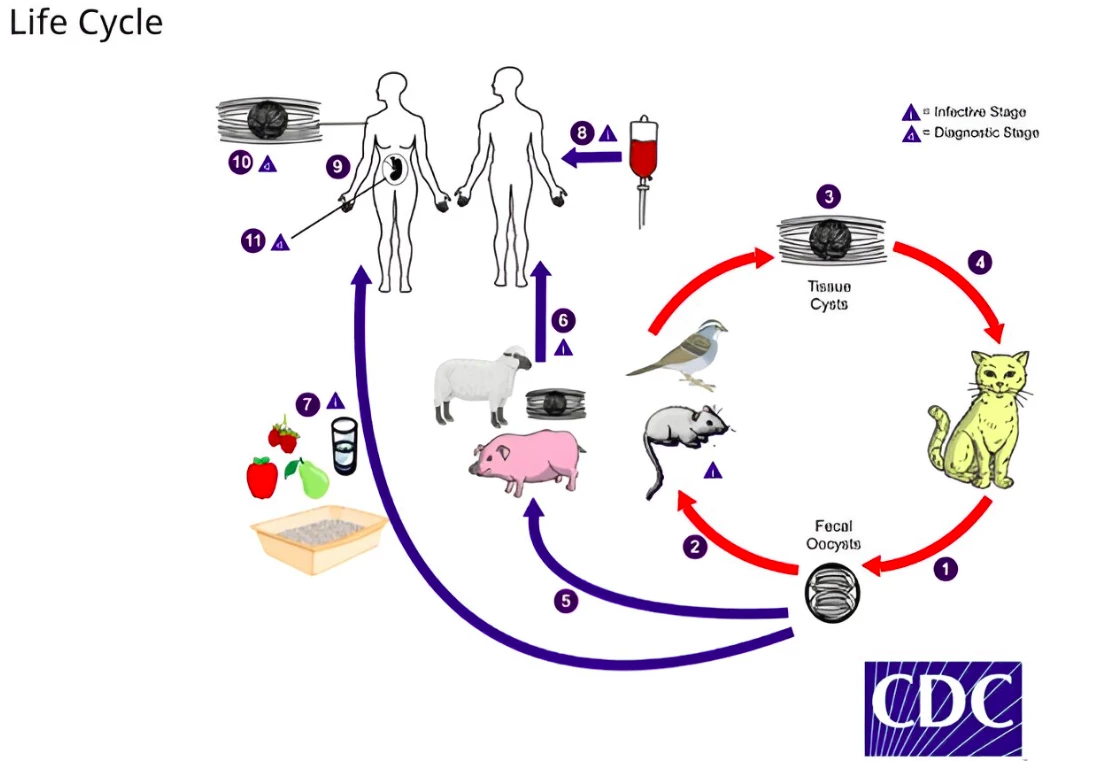The single-cell parasite Toxoplasma gondii is well known for triggering risky behavior in hosts, in order to facilitate easier transmission, and can cause serious mental and physical conditions. But now this tiny bug that thrives in cats (via rats and birds) has been implicated in accelerating age-related frailty.
l
Around 11-15% of people in the US have been knowingly, or unknowingly, infected with T. gondii during their lifetime. The parasite can live in the human host for a lengthy period, or even a lifetime. But due to the body’s immune system, a healthy person should experience very few symptoms, if any.
According to the Centers for Disease Control and Prevention, more than 40 million Americans carry this parasite, which is best known as toxoplasmosis infection. But even if it lies dormant and largely asymptomatic, scientists believe it may be partly to blame for accelerating age-related frailty, not through the infection itself but the body’s immune system response to its microscopic invader.
Researchers at the University of Colorado Boulder, University of Maryland School of Medicine and the University of A Coruña in Spain have for the first time linked it to frailty in older adults.
“We often think of T. gondii infection as relatively asymptomatic, but this study highlights that for some people it may have significant health consequences later on,” said co-author Christopher Lowry, a professor in the Department of Integrative Physiology at CU Boulder.
Frailty is a geriatric syndrome characterized by physical and cognitive decline. It’s a complex condition that can result in weight loss, exhaustion, low physical activity, slowness and weakness, as well as increased falls and hospital visits, and longer recovery from illnesses. While not inevitable, around 10% of the population 65 years and over will have diagnosed frailty, and this number jumps to between a quarter and half of those aged 85 years and over.
Looking for the prevalence of T. gondii infections among older adults with frailty, the scientists hypothesized that contracting this bug itself may trigger more rapid age-related physical and cognitive decline.
But in their study of 601 Spanish and Portuguese adults over 65 with health measures indicating frailty, the researchers found 67% of the participants were seropositive, or showing an accumulation of antibodies as a result of an earlier T. gondii infection. As such, they did not find a link with infection, but saw that those with higher serointensity – a greater concentration of parasite-specific antibodies – were significantly more likely to have the hallmarks of frailty.
“This paper is important because it provides, for the first time, evidence of the existence of a link between frailty in older adults and intensity of the response to T. gondii infection,” said co-author Blanca Laffon, a professor of psychobiology at the Interdisciplinary Centre of Chemistry and Biology at University of A Coruña.
What’s more, frail participants with high seropositivity also had elevated inflammation markers, suggesting that when the parasite triggers this immune response, it also amplifies inflammation already associated with aging.
And because T. gondii enjoys hiding out in muscle tissue, this could be connected to sarcopenia – age-related muscle wasting.
One of the most common way to be exposed to T. gondii is cleaning out the kitty litter. While the parasite enjoys a secondary host in the likes of birds and rodents, the feline is the end goal. Here, it will breed in the mammals’ intestines, where its eggs will be transported straight to the litter tray. (Eggs are also found in contaminated water, unwashed vegetables and undercooked meats.)
Studies have shown how the parasite encourages its hosts to exhibit a range of unusual and risky behavior, in order to better facilitate transmission. Rats and mice will lose their fear of cats, making them much easier to catch. Infected chimpanzees have been seen to become attracted to the urine scent of their feline predator, the leopard.
As for humans, research has shown how T. gondii encourages risky and impulsive behavior, making people more entrepreneurial and more prone to car accidents. They also have a higher rate of schizophrenia and certain mood disorders, due to the parasite’s preference for depositing cysts in the cortical region of the brain. This large, important area processes and registers incoming sensory information.
One bizarre study even suggested the parasite was able to make an infected human appear more sexually attractive, in order to increase its chances of close contact with another potential host.
The researchers are hoping this study will lead to more research to understand the connection between T. gondii and frailty, and in turn ways to prevent it from exacerbating age-related decline.
They also note it’s not a sign to say bye-bye to Whiskers but to be aware of hygiene and risk when cleaning out the cat litter, particularly for those with compromised immune systems and people aged 65 and over, when the immune system begins to more sharply decline.
“Our study, performed in an Iberian older adult population with high T. gondii seroprevalence, is the first, to the best of our knowledge, to link serological markers of chronic T. gondii infection with frailty,” the paper noted.
The study was published in the Journal of Gerontology: Medical Science.
Source: University of Colorado Boulder






